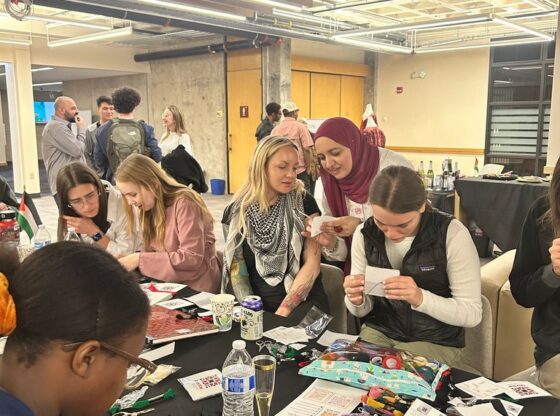About twenty students engaged in a discussion lead by Colorado’s former governor yesterday to mull through opposing and developing views on immigration.
Former Governor and Co-Director of the Institute for Public Policy Studies at DU Richard Lamm fielded students’ questions on his views on immigration in Mary Reed in the last Voltaire Society lecture of the year, “Immigration in focus.” The lecture evolved into an active forum involving most voices of students present.
Lamm started with the warning that the generation of today’s college students is set up to pay a heavy price for the fiscal irresponsibility and inequitable economy formed at the hands of their parent’s generation.
“I guarantee every generation is caught by surprise,” said Lamm. “This happens to be your generation’s time to fix it [the political and economic systems].”
The consequences of what Lamm called “an overindulgent American public that doesn’t want to pay” translate into the immigration debate insofar as what he sees as America’s need to become a model of sustainability.
“Our maximum generosity in immigration can’t touch world poverty,” said Lamm.
Although Lamm said he has confidence that America has the imagination to move towards sustainability, he added that relying on old political methods of transferring money from generation to generation is a solution appropriate to the past but disastrous to the future.
In the same vein, approaching the immigration issue without regard for limits in how much and how well America can sustain large numbers of illegal Hispanic immigrants could be public policy malpractice.
“It’s a terrible problem [the current immigration issue], because it has a human face,” said Lamm. “I think the rallies shocked America awake to the size of the problem.”
Lamm pointed out that 40 percent of immigrant workers are paid off-book. He added that immigration has undercut wages for Americans, compromising a tight labor market.
At the same time, Lamm was warm to immigration, calling it a “source of ideas and inspiration” and played a part in the realization that strict protectionism in domestic policy doesn’t work.
Lamm placed Mexico in the context of “disappearing” foreign aid, in relation to a student’s statement about the situation of American financial aid to Africa. As is the case with aiding Africa, Lamm said that transcending lingering political corruption, the large gap between rich and poor and the high birth rate in Mexico make it a “very hard nation to help.”
Lamm drew upon numerous new books’ proposition addressing the question: are Mexicans Italians?
This concept traces back to Italians’ relatively long time required to reach comparative economic success with their Jewish and Irish immigrant counterparts in nineteenth century America.
Lamm said that he thinks this question is important in America’s future. He is currently writing a book about minority underachievement.
With this, the discussion turned to educational issues and the immigrant community. Lamm cited a statistic about the great discrepencies in word exposure per hour between children of low and high socioeconomic status. These developmental inequalities become hurdles to overcome in the classroom.
Lamm wrapped up the dialogue with the observation that many of American society’s problems lie in a no man’s land in places people don’t want to go.











